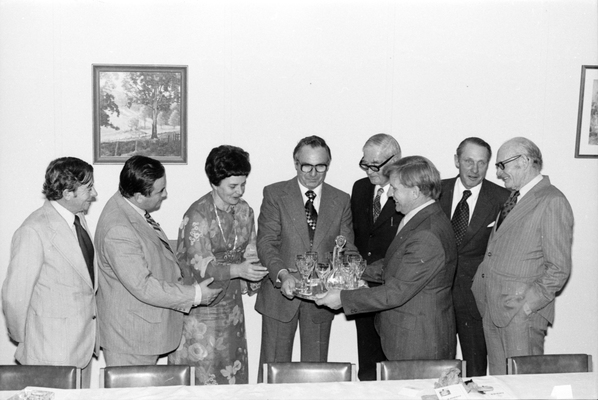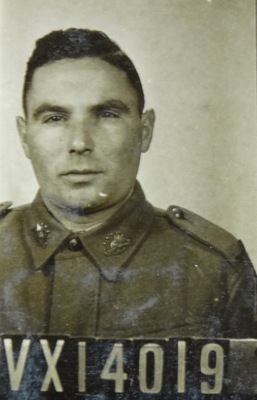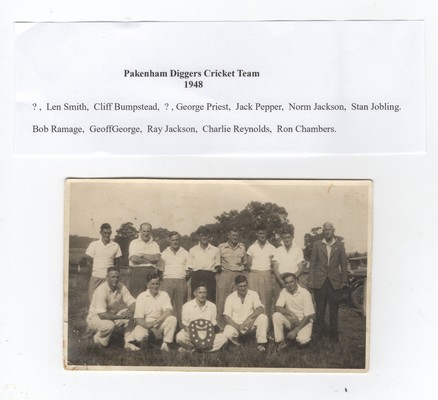
By Garry Howe
The World War II story of long-time Pakenham shire engineer Ron Chambers has all the elements of a best-selling book, or blockbuster film – heroism, bravery, brutality, humanity and, eventually, love.
Yet not many people know it.
An intensely private man, Ron didn’t talk much about his war years.
He rarely spoke about how he single-handedly cleared a path through a minefield under heavy shelling that earned not only great respect from his comrades, but a Military Medal.
Or that he stuck up for men under his charge in a POW camp, again earning their respect – and brutal treatment at the hands of his German captors.
The man who would help shape the region from Doveton to Bunyip as a long-serving shire engineer spent months in solitary confinement in a dark cell, often in leg irons and handcuffs.
And through all that, he met the love of his life.
As the story goes, a young German woman would pass food to Ron through the barbed wire of a Prisoner of War camp to help sustain him during that period. In captivity, Ron’s weight dropped from 13 stone (82.5kg) and went to 7 stone 3 pounds (46kg).
That woman, Gertraund Krahnke – or more commonly referred to locally as Wandel – emigrated to Australia in 1948 to marry Ron Chambers. They settled in Pakenham and had two children, Fay and Brent.
Ron went on to become a prominent figure in the community – and particularly in local government. He worked for the shires of Berwick and Pakenham (after they split) for 44 years and spent 30 of those years (1947-’77) as shire engineer. He followed Harold Keys into that role and between them they held the shire’s top engineering role for a century.
Ronald Joseph Thekla Chambers was born in Williamstown to Michael James Chambers and Lillian May Choury (Koury), whose family was Lebanese.
His father was a “popular day-man tending the roads of Berwick Shire”, according to the Dandenong Journal.
Ron also went on to work for the shire and was assistant Berwick Shire engineer/surveyor at the time of enlistment in the Second AIF. He had previously served with the militia.
After training, Ron was posted with the 2/8 Field Company of Engineers and by August 1940 had been promoted to Acting Corporal.
Given a few days’ pre-embarkation leave, he came back to Pakenham and was given a farewell at Pakenham by 50 people at the home of Mrs and Mrs Thwaites.
“Glowing tributes to the sterling qualities of the guest of honour were paid by several speakers” including Rev E. J. Dodd, Dr W G. Farrell and J.J. Ahern, according to a Pakenham Gazette report.
Berwick Shire also hosted a farewell luncheon, where he was given a gift from councillors and staff. Shire President A.G. Robinson said “all were very proud that he, with other young men, had answered the call of his country. He took with him the best wishes of the councillors, officers and Press. His position would be kept open for him and a warm welcome would be extended to him on his return”.
Cr Bourke spoke of the “good work” done by Ron and “his keen interest in and help for all local activities”. Crs Whiteside and Gardiner and shire engineer Harold Keys spoke in the highest terms of Ron’s “many fine qualities and his excellent work” – then presented him with a wallet of notes and wished the best of luck.
In October 1940, Ron embarked Melbourne for Palestine, having been promoted to Lance Sergeant.
A letter of his was published in the Gazette describing the action there.
“I assure you that I have not been given a VC yet, but by hell, I’ve been dirty – so dirty at times that my flannel has positively itched – but I’m still in one piece,” he wrote.
He described fighting the Italians as a “good, lazy life … I only hope the Huns are as yellow, but of course we know they are not”.
Ron soon came face to face with the Hun.
On 27 January 1941 an infantry brigade attacked the Libyan town of Derna. Ron’s section was ordered to carry out reconnaissance of the road south of the Wadi Derna and they engaged the enemy.
According to his Military Medal citation, the escort vehicle was hit and the ‘recce’ party and escort returned to battalion headquarters to report.
Upon returning to the front, Lance Sergeant Chambers was informed of a minefield south of the road. He proceeded forward without escort and under contninous shell-fire disarmed three-quarters of a mile of minefield to enable Australian cavalry to advance.
Another Pakenham Digger, Frank Webster, described Ron’s service in Libya in a letter home, published in the Journal: “He was mine-spotting with the engineers, and for quite a while the leading Aussie soldier – a hair-raising job at the rate we advanced”.
By the time the award was made, Ron had become a POW – captured in Crete during the failed Allied defence of the island against the Germans.
Alex Crawford of Officer – another Berwick Shire employee serving in the Middle East – wrote home to say that Ron’s unit was cut off by the enemy on Crete.
“As they were in a hopeless position they were forced to surrender in a body,” he wrote.
It was confirmed in December 1941 that Ron was a POW at Stalag X111C. He wrote to the councillors and council staff from Germany: “Dear Friends from Germany this New Year’s Day I send you all the best of good tidings for a prosperous and eventful 1942. I will be seeing you again in a few years and I hope to find Aussie as good a place as when I left it. Things here are not too bad with me and I’m fattening fast. I’ll want a draught horse to carry me when I return! – Ron”.
After Ron was taken POW, the Council decided to “adopt” a POW – paying one pound per week for their upkeep. Cr D.N. McBride said it would be “nice” if they could adopt Ron, but it was not possible – but asked the Red Cross to attribute their gift to the fact that “one of their own men” was a prisoner.
In other letters from Ron published in the Dandenong Journal, he said he had received four Red Cross parcels in three weeks “filled with the most sumptuous foods”. One which recently came was a Christmas parcel “with everything down to roast pork, chocolate and biscuits”.
“I have all the food I can eat at present, a hot bath each week, my washing done for me and I am with very nice people during the day. I teach the children English, milk the cow and generally fill the day with work. My German is improving each day and I am going to learn it really perfectly. I’m fattening well. Keep your chins up. It isn’t a bad old world after all when all is quiet”.
In other letters, he said the Red Cross parcels were “taxing his eating powers to extreme”. He also wrote “there was a bottle of German beer in front of him – it being Sunday”.
“Time simply flies here” he added, asking that the local MP and councillors “get to work and try and have complete uniforms sent to all Australian prisoners”.
By April 1942, things turned nasty for Ron, who was arrested and court martialed over a dispute that occurred between German authorities and a working party he was heading up near the town of Lebenham.
After physical violence and the threat of a firing squad, Ron was tried on various counts “closely resembling active mutiny” and sentenced by the Germans to five years with hard labour. His lawyer later had the “hard labour” omitted, but the sentence stood.
He spent eight months at the Fort Zinna military prison in Germany, two of those in a dark cell in leg irons and handcuffs and a further two in solitary confinement. He was then transferred to a prison in Graundenx, Poland, where the treatment was little better and then across across Germany to Wiirzburg, where he was acquitted of all but one charge.
Ron arrived back in England in May 1945 after the German surrender and when returning to Australia, elected to be discharged from the Army, which was granted on compassionate grounds as an ex-POW.
Ron returned to Pakenham and was given a large welcome home at the Thwaites’ house, where he had been farewelled years before.
“According to Ron, one of the most cheery messages he received whilst a prisoner of war was from Mrs Thwaites 3.5 years ago – reminding him of the farewell party and cheering him with the promise that when he was back home again his friends who had farewelled him would assemble once more to welcome him back,” the Gazette reported.
Mr Thwaites referred to Ron’s “splendid service overseas, to his friends’ high regard for him, their anxiety when he became a prisoner of war and their delight in his safe return”. Other speakers included Cr Bourke, Norman Webster, H.L. Keys (representing shire staff) and Miss Beatrice Thomas of Red Cross.
“All the speakers paid the highest tribute to Ron as a man and a soldier and expressed delight at his safe return. The same sentiment was conveyed to him, too, in the firm handclasp and brief word or two of his other friends, who, through the hospitality of Mr and Mrs Thwaites, had the pleasure of renewing acquaintance with him …”
Ron gave a “brief and modest speech” which acknowledged the congratulations and good wishes and expressed his pleasure at returning home. He referred specifically to the work of the Red Cross and “what their parcels meant to the prisoners of war”.
He soon immersed himself into community life – and rarely spoke about his war years.
Don Jackson worked under Ron for about 30 years and their houses backed on to each other in Gardenia Street, Pakenham. He said Ron rarely talked of the war.
He knew though, that his boss faced the longest stint in solitary confinement ever imposed on an Allied prisoner.
“He was a fairly private man and very direct,” Don recalled. “He was faithful to the people who worked for him. If someone under his control did something good and anyone asked questions that person would get the credit. If they did something wrong the council would never know who was responsible. He took responsibility for the mistake. That was the type of person he was.”
Long-time shire secretary Ray Canobie joined the shire as a young accountant in 1964 and developed an “interesting relationship” with the shire engineer.
“He was a very private guy who didn’t share a lot of himself,” Ray recalled. “He held strong views and wasn’t overly tolerant of things that didn’t go his way.”
He was always “Mr Chambers”.
“I was the young accountant and he was the engineer who didn’t want to be told he was overspending. He would call me in and let me know that he had been doing it this way for years and wouldn’t change.
“As a cheeky young fellow, I would offer my view to the contrary. He would come in to my office later and say ‘I think we had better go for a drive’. He would show me a few of the projects they were working on. We would talk on the way and smooth things over until the next time.”
Despite the odd run-in, Ray never lost respect and admiration for Ron’s standing and his ability to be a leader in his field.
“I have always felt he has been under recognised,” he said.
“He was the first to recognise the importance of town planning. He had vision others had not contemplated. He commissioned what was called metro town plans for the entire old shire of Berwick, so that every village or township retained its identity to ward off the rampant suburban sprawl.”
He also recognised the need to set aside land for environmental purposes, including tracts of land in the Harkaway foothills and Mt Cannibal at Garfield North. Chambers Reserve in Pakenham Upper has been named in his honour.
When he was farewelled upon retirement at the Pakenham racecourse in 1977, guests included none other than the Victorian Premier of the time Sir Henry Bolte.
* This story has been produced from the research of historian and author Patrick Ferry, who is looking to recognise the Pakenham district’s World War II diggers in a book to be launched on Remembrance Day, along similar lines to his project on the World War I Diggers – After The Guns Fell Silent. Mr Ferry wants help in tracing the stories of the World War II soldiers and can be contacted at BPHS1961@gmail.com








